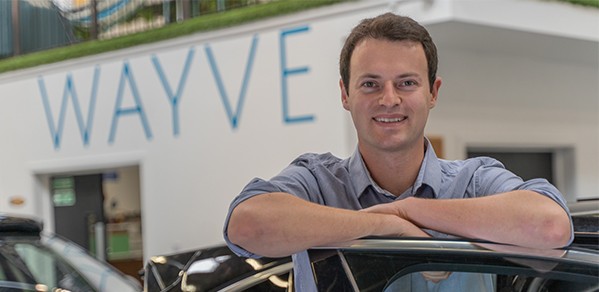
When Alex Kendall co-founded Wayve in 2017, he foresaw autonomous vehicles (AVs) with the intelligence to make their own decisions based on what they see with computer vision. Fast-forward five years and the start-up is pioneering an artificial intelligence (AI) led approach to AVs on a global scale, using the embodied intelligence of an end-to-end deep learning system that continually learns from driving data.
I was fortunate enough to study computer vision and deep learning for my PhD at the University of Cambridge, with a supervisor and an environment which encouraged entrepreneurship.
Alex Kendall
January 2022 marked an important milestone for Wayve CEO Alex and his team, as the London-based start-up announced it had secured investment of $200 million in its Series B funding round to accelerate the development of AV2.0 – the next wave of AVs.
Wayve is reimagining autonomous mobility. Its AI software, lean camera-first sensing suite and fleet learning platform for AV2.0 is designed to be the most adaptable AV system for fleet operators, one which can quickly and safely adapt to new driving domains anywhere in the world.
Wayve – the early days
It was during his PhD in Deep Learning, Computer Vision and Robotics, under the supervision of Professor Roberto Cipolla in the Machine Intelligence Laboratory, that the groundwork for what would become Wayve began to take shape.
In 2015, Alex contributed to developing a novel deep learning algorithm for semantic segmentation – SegNet – a practical algorithm to achieve accurate real-time pixel-level recognition on real driving sequences. The research was published in the journal IEEE Transactions on Pattern Analysis and Machine Intelligence and is one of the journal's and research field's most cited papers.
The early work that led to this paper was first funded by Toyota in 2007 and resulted in Professor Cipolla’s team building a fully labelled/annotated database (CamVid) of urban road scenes and driving videos, with each pixel in every image labelled by hand as belonging to one of 12 classes of object or background (Brostow et al; 2009). Using this data, the Cambridge team then trained state-of-the-art machine learning algorithms for segmenting and labelling each pixel (Shotton et al; 2008 and Badrinarayanan et al; 2015). In later years, Vijay Badrinarayanan and Jamie Shotton both joined Alex at Wayve as VP Autonomy (2020) and Chief Scientist (2021) respectively.

Alex Kendall and Professor Roberto Cipolla.
In a recent blog post, Alex said: “I was fortunate enough at this time (2014-2017) to be studying computer vision and deep learning for my PhD at the University of Cambridge, with a supervisor and an environment which encouraged entrepreneurship. Our award-winning research showed for the first time that it was possible to use deep learning to teach a machine to understand where it is and what’s around it, plus crucially understand what it doesn’t know.
“With this breakthrough technology, I imagined we could now move away from what we predicted to be the prohibitive hurdles to scale such as HD-maps, LiDAR and rules-based autonomy, towards machines that have the intelligence to make their own decisions based on what they see with computer vision.
“Wayve began in a garage, developing a Driving Intelligence. The results were quickly promising. For the first time in the world, we showed a reinforcement learning system learning to drive a real-life autonomous vehicle from computer vision. In our first year, we demonstrated model-free and model-based reinforcement learning driving our car, sim2real and more.
“In five quick years, we established the necessary ingredients to pioneer AV2.0: data, compute, partnerships, operations and – most importantly – our team. We’ve solved the fundamental technical challenges and earned the right to build AV2.0 at scale.”
Wayve – the next chapter
Using machine learning, Wayve is building a more scalable AV platform that can adapt its driving intelligence to new cities, different use cases and vehicle types, both quickly and safely. This unlocks the potential to scale commercial deployments to other cities more quickly than the conventional AV approach, which typically relies on an expensive and complex array of sensors and is operationally limited by high-definition (HD) maps and rules-based control strategies. Wayve aims to be the first to deploy autonomy in 100 cities.
Wayve’s AV2.0 technology learns from petabyte-scale driving data provided by its commercial partner fleets. The announcement of the new investment from prominent global financial investors and strategic partners will enable Wayve to do the following:
- To continue to grow its team. The start-up currently employs more than 120 people, including machine learning experts and AV industry veterans
- Develop a Level 4+ AV prototype for passenger vehicles and delivery vans
- Scale its deployments on partner fleets to commence last-mile delivery pilots
- Develop the data infrastructure to improve its core autonomy platform at fleet scale. Achieving this will improve the accessibility of AV technology, allowing more businesses and individuals to benefit from safer, sustainable and more reliable forms of transportation.
“We were the first team to develop the scientific breakthroughs in deep learning to build autonomous driving technology that can easily scale to new markets using a data-learned approach,” said Alex. “Today, we have all of the pieces in place to take what we have pioneered and drive AV2.0 forward.
“We have brought together world-class strategic partners in transportation, grocery delivery and compute, along with the best capital resources to scale our core autonomy platform, trial products with our commercial fleet partners and build the infrastructure to scale AV2.0 globally.”
The latest round of funding brings total equity raised to $258 million since inception and reinforces Wayve’s position as a leader in autonomous driving.

